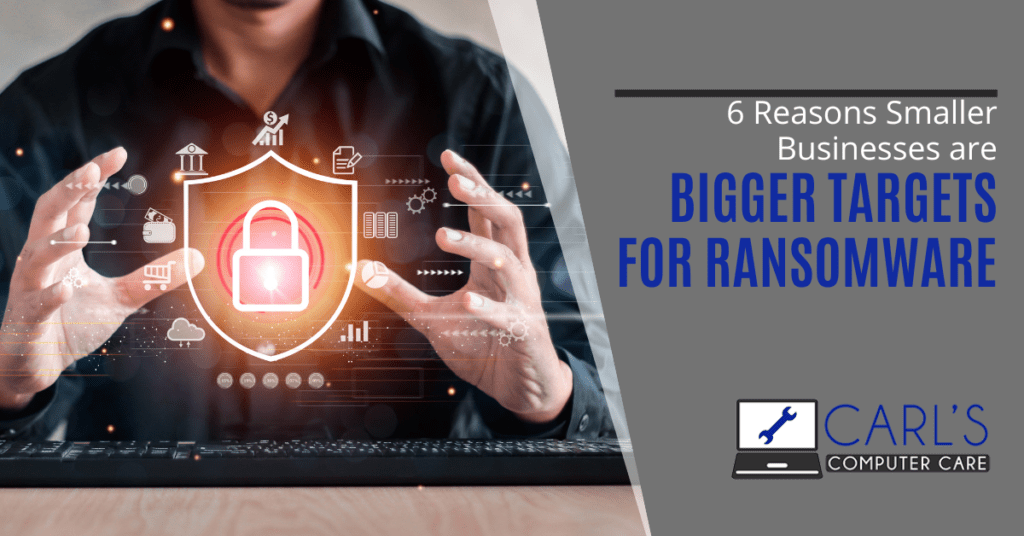
The IT services of most small and medium businesses lack the right amount of protection against cyber threats. Ransomware attackers are aware of this and, as a result, shift their focus from larger organizations whose security systems are often top-notch. This year, CyberEdge Cyberthreat Defense reported that organizations with about 25,000 workers are less likely to get hit by cyber threats. On the other hand, small businesses have a 70% probability of experiencing a ransomware attack yearly.
Every small business owner needs to know why they are an easy target. This will help refine their steps toward preventing ransomware attacks.
What is Ransomware?
Ransomware is a type of malware that encrypts data on a company’s systems. It spreads fast and often can prevent a company from operating. Cybercriminals use malicious software to block access to systems, files, and records. The attackers then demand a ransom, usually in the form of untraceable bitcoin, in exchange for releasing the decryption key. Failure to pay up can lead to the loss of all vital information and consequent shutdown of the company.
Although the FBI and other government agencies warn against meeting the attacker’s demand, business owners are usually desperate to save whatever they can. Affording the ransom, which is generally huge, might drain the resources of a small business, leaving them but a little to work with when it’s all over. It also leaves them more susceptible to consequent ransomware attacks.
Why Smaller Businesses are Bigger Targets for Ransomware
Negligence About Security
Small business owners often don’t have adequate security services. They may believe they are not at risk because of their size. Larger businesses are thought to be the focus, for they are more capable of paying a huge ransom. This belief, however, is one of the main reasons ransomware attackers target smaller companies.
Their systems are easier to breach since they are hardly protected in the first place. Their budget for IT security is low, leaving their sensitive data unguarded. As long as cybersecurity is not a priority to a company, it’ll most likely keep facing multiple cyberattacks.
SMBs Create an Easy Way to Access Larger Organizations
Ransomware attackers invade small businesses to find a gateway leading to a larger enterprise. Many large companies partner with small and medium businesses to increase their reach. When this happens, there’s usually a cyber connection between the two parties that can expose the other to the threat should one be attacked. Since the big-name companies employ high-end security services, accessing their systems head-on will be more challenging and almost impossible.
Failure to Adequately Train Employees
Most SMBs do not educate their workers on cybersecurity and the consequences of cyberattacks. The business owners sometimes have no solid knowledge about these threats and, as such, have nothing to pass on to their workers. The employees are, as a result, ignorant and negligent when abiding by essential security rules. The company ends up being nothing but vulnerable to ransomware attacks and other forms of cyber threats.
Small Businesses Pay Ransoms Quicker
The vulnerability of small companies is one of the reasons why they are a constant target. They plant fear in their minds and leave them with no viable option. When a small business experiences a ransomware attack, it risks losing all it has spent years building and nurturing.
While the ransom costs them most of their resources, it always seems a better option since losing all data, files, and records is the other option. The fear of shutting down their years of hard work makes them oblige to the attackers’ requests.
Risk of Exposure to Security Agencies
Ransomware attackers prefer hitting on small companies since being a threat to larger ones risks exposure. Large organizations have security services that are toilsome to breach. The chances of failure are high and getting caught is much easier. These companies will involve government agencies to help combat the attacks and capture the offenders. This is, however, less likely to happen with small businesses.
Huge Exposure to CEO Fraud
CEO fraud has been on the rise lately, and small businesses quickly fall into this trap. The cybercriminals compose dubious messages and email them to employees or use SMS phishing while pretending to be the company’s CEO. The emails usually contain requests for confidential information or security details that ease the infection of the company’s systems with malware. A reasonable amount of their targets, unsurprisingly being SMBs, further increased the susceptibility of this group to a ransomware attack.
How To Prevent Ransomware Attack
- Educate your employees on the need to obey security policies and how to identify cyber threats.
- Adopt top-notch security software and constantly update to new versions once they are available.
- Conduct security assessment tests regularly to help identify any lapses in your security strategies.
- Always back up your data as that will help recover your files should you fall victim to ransomware.
For help installing efficient security software or more tips on security and IT services, contact Carl’s Computer Care at (225) 315-3498 or fill out our contact form.
